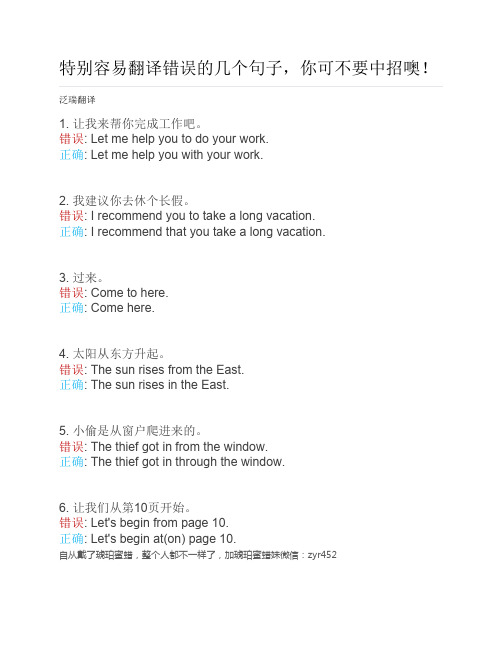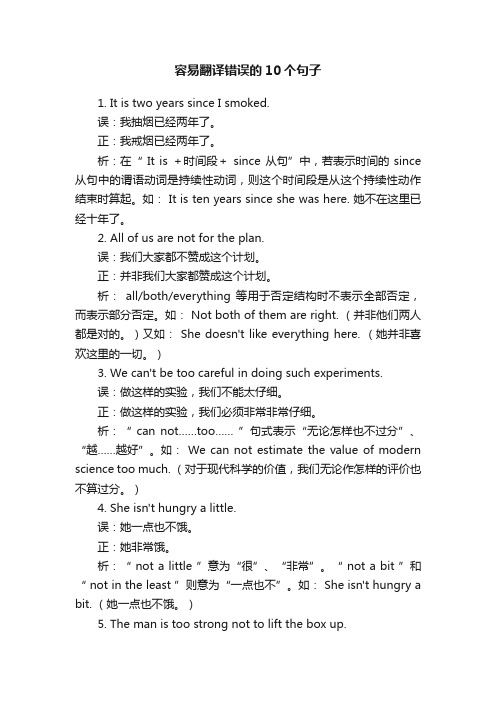最容易翻译错的25个汉语句子
容易翻译错误的句子

容易翻译错误的句子1.中国的京剧你觉得怎样?How do you think of Chinese opera ? (误)What do you think of Chinese opera? (正)How do you feel about Chinese opera? (正)How do you like Chinese opera? (正)2.第二次世界大战是在一九四五年八月十五日结束的。
The World War II came to an end on August 15, 1945. (误)World War II came to an end on August 15th, 1945. (正)The second World War ended on August 15th, 1945. (正)3.昨天晚上我们整晚在看电视。
We spent last evening watching the television. (误)We spent last evening watching television. (正)注:”Television” is uncountable. The countable term is a “television set”.4.旅行社告诉了我们许多关于夏威夷的情形。
The travel agency sent us many information about the Hawaiian Islands. (误)The travel agency sent us much information about the Hawaiian Islands. (正)注:”Information” is uncountable.5.假期从明天开始。
The vacation begins from tomorrow. (误)The vacation begins tomorrow. (正)注:We don’t say “begin from”, but “start from”. Other collocations with “begin”: The new term begins in April / on the 5th of April. The tea party begins at six o’clock. Education begins with a man’s birth.6.这只表的价钱很贵。
翻译硕士总结汉译英最易翻错的句子

翻译硕士总结汉译英最易翻错的句子01. 有他这颗扫帚星,什么事情都办不成。
[误] With a comet like him, nothing can be accomplished.[正] With a jinx like him, nothing can be accomplished.注:“扫帚星”是中国人对“慧星”(comet)的俗称,因其后面象拖着的一条像扫帚一样的长尾巴而得名。
在中国古代,“扫帚星”被认为是灾难的预兆,并被用来比喻不吉利的人或事;祸根:(person or thing that is thought to bring)bad luck(to sb/sth);curse。
英语的comet 虽然没有这层含义,但却有一个对应的说法,即jinx。
例:There’s a jinx on/Someone’s put a jinx on this car: it’s always giving me trouble. “这辆汽车上有什么妨人的东西,总给我找麻烦”。
02.萝卜青菜,各有所爱。
[误] Some prefer radish but others prefer cabbage.[正] Tastes differ.注:Tastes differ/vary 是句英语谚语,除此以外,原句还可翻译成No dish suits all tastes 或You can never make everyone happy 等。
《新概念英语》第三册第23课的标题是:One man’s meat is another man’s poison,表达的很生动。
总之,应采取意译。
03.他一向嘴硬,从不认错。
[误] He has always got a hard mouth and never admit a fault.[正] He never says uncle.注:say (cry) uncle: to give up or in; to surrender; to admit defeat. Mainly used by boys, as when fighting。
特别容易翻译错误的几个句子,你可不要中招噢!

特别容易翻译错误的几个句子,你可不要中招噢!泛瑞翻译1. 让我来帮你完成工作吧。
错误: Let me help you to do your work.正确: Let me help you with your work.2. 我建议你去休个长假。
错误: I recommend you to take a long vacation.正确: I recommend that you take a long vacation.3. 过来。
错误: Come to here.正确: Come here.4. 太阳从东方升起。
错误: The sun rises from the East.正确: The sun rises in the East.5. 小偷是从窗户爬进来的。
错误: The thief got in from the window.正确: The thief got in through the window.6. 让我们从第10页开始。
错误: Let's begin from page 10.正确: Let's begin at(on) page 10.自从戴了琥珀蜜蜡,整个人都不一样了,加琥珀蜜蜡妹微信:zyr4527. 我耐心有限。
错误: There is a limit in my patience.正确: There is a limit to my patience.8. 请在白线内等待。
错误: Please wait inside the white line.正确: Please wait behind the white line. 9. 你家房子买了火险吗?错误: Is your house insured for fire?正确: Is your house insured against fire?10. 我没地方住。
错误: I have no house to live.正确: I have no house to live in.11. 脸好脏!照照镜子。
容易翻译错误的10个句子

容易翻译错误的10个句子1. It is two years since I smoked.误:我抽烟已经两年了。
正:我戒烟已经两年了。
析:在“ It is +时间段+ since 从句”中,若表示时间的 since 从句中的谓语动词是持续性动词,则这个时间段是从这个持续性动作结束时算起。
如: It is ten years since she was here. 她不在这里已经十年了。
2. All of us are not for the plan.误:我们大家都不赞成这个计划。
正:并非我们大家都赞成这个计划。
析:all/both/everything 等用于否定结构时不表示全部否定,而表示部分否定。
如: Not both of them are right. (并非他们两人都是对的。
)又如: She doesn't like everything here. (她并非喜欢这里的一切。
)3. We can't be too careful in doing such experiments.误:做这样的实验,我们不能太仔细。
正:做这样的实验,我们必须非常非常仔细。
析:“ can not……too…… ”句式表示“无论怎样也不过分”、“越……越好”。
如: We can not estimate the value of modern science too much. (对于现代科学的价值,我们无论作怎样的评价也不算过分。
)4. She isn't hungry a little.误:她一点也不饿。
正:她非常饿。
析:“ not a little ”意为“很”、“非常”。
“ not a bit ”和“ not in the least ”则意为“一点也不”。
如: She isn't hungry a bit. (她一点也不饿。
)5. The man is too strong not to lift the box up.误:这个人力气不够大,不能把这只箱子提起来。
汉译英最易翻错的100句

汉译英最易翻错的100句1.我们要把祖国建设成为社会主义的现代化强国。
[误] We will build our motherland into a socialist modern powerful country.[正] We will build our motherland into a modern powerful socialist country.注:形容词作为修饰语在汉语和英语中都很常用,但使用的先后次序却有所不同。
在英语中我们一般遵循“靠近原则”,即越能说明本质属性的修饰词越靠近它所修饰的名词,当从这一点看不出区别时,就靠词的长短来决定,短的在前,长的在后。
原文中最能说明“国家”本质的定语是“社会主义的”,所以socialist 要最靠近它所修饰的中心词。
2.中华人民共和国主席[误] Chairman of the People's Republic of China[正] President of the People's Republic of China注:以前,我们一直将“主席”翻译为chairman,例如:great leader Chairman Mao(伟大领袖毛主席)。
其实“主席”与chairman 并不等义,chairman 在英语中通常指会议或某一具体组织的负责人,它的权力和重要性不及中文的“主席”。
这就是为什么1983年,在我国《宪法》的英译单行本中开始使用President一词,并沿用至今。
另外,国内仍有不少词典把“班/级长(学校的)”译为“class monitor”,这是“四人帮”时代的产物,那时的“班长”是专司监管学生的,所以译作“monitor”。
而“班长”的正确译文应该是“class president”。
21.最近的人口统计显示中国人口已超过12亿。
3.最近的人口统计显示中国人口已超过12亿。
[误] The latest census shows that China's population has surpassed 1.2 billion.[正] The latest census shows that China's population exceeds 1.2 billion.注:surpass 和exceed 译成中文虽然都是“超过,胜过”的意思,但出现具体数字时要用后者。
中国人最易犯的汉译英错误共29页

16、人民应该为法律而战斗,就像为 了城墙 而战斗 一样。 ——赫 拉克利 特 17、人类对于不公正的行为加以指责 ,并非 因为他 们愿意 做出这 种行为 ,而是 惟恐自 己会成 为这种 行为的 牺牲者 。—— 柏拉图 18、制定法律法令,就是为了不让强 者做什 么事都 横行霸 道。— —奥维 德 19、法律是社会的习惯和思想的结晶 。—— 托·伍·威尔逊 20、人们嘴上挂着的法律,其真实含 义是财 富。— —爱献 生
谢谢!
36、自己的鞋子,自己知道紧在哪里。——西班牙
37、我们唯一不会改正的缺点是软弱。——得很慢,但是我从不后退。——亚伯拉罕·林肯
39、勿问成功的秘诀为何,且尽全力做你应该做的事吧。——美华纳
40、学而不思则罔,思而不学则殆。——孔子
翻译技巧:汉译英最易翻错的100句(13)

翻译技巧:汉译英最易翻错的100句(13)[误] Here comes the car. You go first, please.[正] Here comes the car. After you.注:第一句译文虽然把“请”翻译出来了,但还是带有命令的口吻。
地道的说法应当是 After you。
另外,不少人以为汉语的“请”等同于英语的 please,其实并非如此。
例如,在餐桌上请人吃菜或喝酒就不用please,地道的说法是 Help yourself。
62. 房间里有一张床、两张桌子和五把椅子。
[误] There are one bed, two desks and five chairs in the room.[正] There is one bed, two desks and five chairs in the room.注:there be 句型中,be 动词的单复数取决于离它最近的那个词。
原文虽然一共列举了八件家具,但是依据英语的谓语就近原则,one bed 打算了应当使用 is。
63. 我不想听他那些空话。
[误] I don’t want to hear his empty words.[正] I don’t want to hear his hollow words.注:虽然 empty 和 hollow 都有“空洞的”之意,但表达“空话”时,英语习惯用 hollow words 或 empty talk。
64. 他是我们的死敌。
[误] He is our dead enemy.[正] He is our deadly enemy.注:dead 作形容词时表示“死的,无感觉的”,而 deadly 才表示“致命的,不共戴天的”。
65. 奥斯本名义上是个医生,但他成天都呆在股票交易所里。
[误] Osborne is a doctor by name only, but he stays in the stock exchange all day long.[正] Osborne is a doctor in name only, but he stays in the stock exchange all day long.注:by name 和 in name 虽然形似,但涵义却有区分。
中国人最易犯的汉译英错误

9.忽 9.忽…忽, 这些日子天气多变,忽冷忽热。 这些日子天气多变,忽冷忽热。 The weather is suddenly cold and then hot those days. The weather is changeable these days, now cold, now warm. 他的情绪不断变化,忽喜忽悲。 他的情绪不断变化,忽喜忽悲。 His moods kept changing, now happy, now sad.
12.晒黑 12.晒黑 我的皮肤晒得比你黑。 我的皮肤晒得比你黑。 My skin has become blacker than yours. I’ve got a more tanned skin than you. I’ve got more tanned than you.
中国人最容易犯的汉译英错误
1.容易 1.容易 冬天,人们容易感冒。 冬天,人们容易感冒。 In winter, people are easy to catch cold. In winter, people tend to catch. In winter, people are tending to catch cold. In winter, people arቤተ መጻሕፍቲ ባይዱ apt to catch cold. In winter, people are liable to catch cold.
(3)体现或反映(某种方向或利益) (3)体现或反映(某种方向或利益) 体现或反映 例:三个代表 Three Represents The Party should always represent the development needs of China’s advanced social productive forces, always represent the onward direction of China’s advanced culture, and always represents the fundamental interests of the largest number of the Chinese people.
- 1、下载文档前请自行甄别文档内容的完整性,平台不提供额外的编辑、内容补充、找答案等附加服务。
- 2、"仅部分预览"的文档,不可在线预览部分如存在完整性等问题,可反馈申请退款(可完整预览的文档不适用该条件!)。
- 3、如文档侵犯您的权益,请联系客服反馈,我们会尽快为您处理(人工客服工作时间:9:00-18:30)。
最容易翻译错的25个汉语句子1. 我很喜欢它。
False: I very like it.True: I like it very much.2. 这个价格对我挺合适的。
False: The price is very suitable for me.True: The price is right.suitable(合适的、相配的)最常见的用法是以否定的形式出现在告示或通知上,如:下列节目儿童不宜。
The following programme is not suitable for children在这组句子中用后面的说法会更合适。
3. 你是做什么工作的呢?False: What’s your job?True: Are you working at the moment?what’s your job这种说法难道也有毛病吗?是的。
因为如果您的谈话对象刚刚失业,如此直接的问法会让对方有失面子,所以您要问:目前您是在上班吗,Are you working at the moment,接下来您才问:目前您在哪儿工作呢,where are you working these days,或者您从事哪个行业呢,What line of work are you in,顺带说一下,回答这类问题时不妨说得具体一点,不要只是说经理或者秘书。
4. 用英语怎么说?False: How to say in English?True: How do you say this in English?How to say是在中国最为泛滥成灾的中国式英语之一,这决不是地道的英语说法。
同样的句子有:请问这个词如何拼写,How do you spell that please,请问这个单词怎么读,How do you pronounce this word。
5. 明天我有事情要做。
False: I have something to do tomorrow.True: Sorry but I am tied up all day tomorrow.用I have something to do来表示您很忙,这也完全是中国式的说法。
因为每时每刻我们都有事情要做,躺在那里睡大觉也是事情。
所以您可以说我很忙,脱不开身:I’m tied up.还有其他的说法:I’m afraid I can’t make it at that time. I,d love to, but I can’t,I have to stay at home.6. 我没有英文名。
False: I haven’t English name.True: I don’t have an English name.许多人讲英语犯这样的错误,从语法角度来分析,可能是语法功底欠缺,因为have 在这里是实义动词,而并不是在现在完成时里面那个没有意义的助动词。
所以,这句话由肯定句变成否定句要加助动词。
明白道理是一回事,习惯是另一回事,请您再说几话:我没有钱;I don’t have any money.我没有兄弟姐妹;I don’t have any brothers or sisters.我没有车。
I don’t have a car.7. 我想我不行。
False: I think I can’t.True: I don’t think I can.这一组然是个习惯问题,在语法上称为否定前置,这就是汉语里面说“我想我不会”的时候,英语里面总是说“我不认为我会”。
以后您在说类似的英语句子的时候,只要您留心,也会习惯英语的说法的。
8. 我的舞也跳得不好。
False: I don’t dance well too.True: I am not a very good dancer either.当我们说不擅长做什么事情的时候,英语里面通常用not good at something,英语的思维甚至直接踊跃到:我不是一个好的舞者。
9. 现在几点钟了?False: What time is it now?True: What time is it, please?What time is it now这是一个直接从汉语翻译过的句子,讲英语的时候没有必要说now,因为您不可能问what time was it yesterday或者what time is it tommorow。
所以符合英语习惯的说法是:请问现在几点了?还有一种说法是:how are we doing for time这句话在有时间限制的时候特别合适10. 我的英语很糟糕。
False: My English is poor.True: I am not 100% fluent, but at least I am improving.有人开玩笑说,全中国人最擅长的一句英文是:My English is poor实话说,我从来没有遇到一个美国人对我说:My Chinese is poor。
无论他们的汉语是好是坏,他们会说: I am still having a few problem, but I'm getting better。
当您告诉外国人,您的英语很poor,so what(那又怎么样呢) 是要让别人当场施舍给我们一些英语呢,还是说我的英语不好,咱们不谈了吧。
另外一个更大的弊端是,一边不停的学英语,一边不停地说自己的英语很poor,这正像有个人一边给车胎充气,又一边在车胎上扎孔放气。
我坚信,如果现在就苦下功夫,把EPTIP系列教材吃通吃透,您的IT职业英语水平立即就会迅速的提高。
您以后和外国IT 同行交流时再也不用说:我的英语很poor。
您可以实事求事地说,我的英语还不算十分流利,但至少我在进步。
11. 你愿意参加我们的晚会吗?False:Would you like to join our party on Friday?True: Would you like to come to our party on Friday night?join往往是指参加俱乐部或者协会,如:join a health club; join the Communist Party。
事实上,常常与party搭配的动词的come 或者go。
如go a wild party,或者come to a Christmas Party。
12. 我没有经验。
False:I have no experience.True: I am afraid I don’t know much about that.I have no experience这句话听起来古里古怪,因为您只需要说:那方面我懂得不多,或者这方面我不在行,就行了。
I am not really an expert in this area.13. 我没有男朋友。
False: I have no boyfriend.True: I don’t have a boyfriend.14. 他的身体很健康。
False: His body is healthy.True: He is in good health.You can also say: He’s healthy.15. 价钱很昂贵/便宜。
False: The price is too expensive/cheap.True: The price is too high/ rather low.16. 我们下了车。
False: We got off the car.True: We got out of the car.17. 车速快了。
False: The speed of the car is fast.True: The car is speeding. Or “The car is going too fast.”18. 这个春节你回家吗?Will you be going back home for the Spring Festival?False: 是的,我回去。
Of course! (这一句是错的)True: 当然。
Sure. / Certainly.(这种说法是正确的)以英语为母语的人使用of course的频率要比中国的学生低得多,只有在回答一些众所周知的问题时才说of course。
因为of course后面隐含的一句话是“当然我知道啦!难道我是一个傻瓜吗?”因此,of course带有挑衅的意味。
在交谈时,用sure或certainly效果会好得多。
同时,of course not也具挑衅的意味。
正常情况下语气温和的说法是certainly not。
19. 我觉得右手很疼。
False:I feel very painful in my right hand.True: My right hand is very painful.Or "My right hand hurts(aches)."20. 他看到她很惊讶。
False: He looked at her and felt surprised.True: He looked at her in surprise.21. 我读过你的小说但是没料到你这么年轻。
False: I have read your novels but I didn't think you could be so young. True: After having read your novel,I expected you would be older.22. 她脸红了,让我看穿了她的心思。
False:Her red face made me see through her mind.True: Her red face told me what she was thinking.23. 看到这幅画让我想到了我的童年时代。
False:The sight of these pictures made me remember my own childhood. True: Seeing these pictures reminded me of my own childhood.24. 别理她。
False: Don't pay attention to her.True: Leave her alone.25. 我在大学里学到了许多知识。
False: I get a lot of knowledge in the university.True: I learned a lot in universit。
